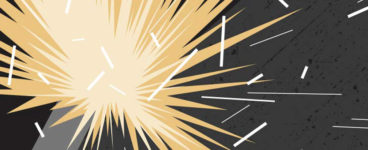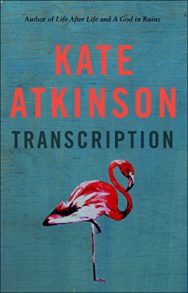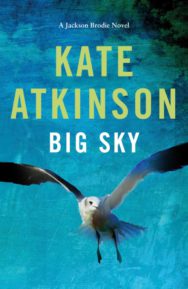‘It has been nine years since Kate Atkinson published her last Jackson Brodie novel, and her new one, Big Sky, reminds us what we have been missing.’
David Robinson welcomes back fan favourite Jackson Brodie and a writer on top of her game.
Big Sky
By Kate Atkinson
Published by Doubleday
When it comes to crime fiction, I’m with WH Auden. In his 1948 essay “The Guilty Vicarage”, he described how, once he started reading a crime novel he was unable to write anything until he had finished it. And yet when he had done so, he forgot the book’s plot immediately and never had the slightest urge to re-read it. “If, as sometimes happens,” he added, “I start reading and find after a few pages that I have read it before, I cannot go on.”
I never knowingly re-read crime fiction either. Granted, I hardly re-read at all, what with life being so short and everything, but I just can’t see the point of picking up a puzzle whose answer I already know. There is only one crime novelist whose work I can ever imagine myself reading for a second time, and even then she probably doesn’t think of herself as a crime novelist in the first place.
It has been nine years since Kate Atkinson published her last Jackson Brodie novel, and her new one, Big Sky, reminds us what we have been missing. The plot, though intricate, isn’t the point. By the end of the book, when it spins out of its hitherto tight constraints for a big-picture, collapse-all-the-dominos finale, she seems to be positively revelling in its artifice.
But then again, I could say exactly the same thing about the way in which she starts the book too. Jackson is sitting next to his bored 13-year-old son Nathan watching the model ship naval battle staged for tourists on the lake at Scarborough’s Peasholm Park. When he was Nathan’s age, Atkinson points out, Jackson’s mother had already died of cancer, his sister had been murdered and his brother had killed himself. Yet Nathan’s mother Julia, she adds, “could go toe to toe with Jackson in the grief stakes – one sister murdered, one who killed herself, one who died of cancer. (‘Oh, and don’t forget Daddy’s sexual abuse,’ she reminded him. ‘Trumps to me, I think’).” Another couple of pages further on, and we are re-introduced to Tatiana, the Russian girl Jackson first met “in another lifetime when she had been a dominatrix and he had been fancy-free and briefly – ludicrously though it seemed now – a millionaire.”
All of this is the barest precis of Atkinson’s first two Jackson Brodie novels, Case Histories and One Good Turn, and you no sooner read it than you wonder whether anything plausible could conceivably come from such an extravagant gallimaufry of grief and good fortune. But Atkinson takes off on her own track. She both uses and then makes you forget the basics of genre fiction. She takes a cliché – the maverick cop, the sullen teen – out for a spin, and by the time she’s finished with it you’ve forgotten that it was a cliché to start with.
Let’s take another example: Vince Ives, middle-aged telecoms area sales manager living on the Yorkshire coast, and a central character in Big Sky. Here’s how Atkinson introduces him:
“He was grinding towards fifty and for the last three months had been living in a one-bedroom flat behind a fish-and-chip shop, ever since Wendy turned to him one morning over his breakfast muesli – he’d been on a short-lived health kick – and said, ‘Enough’s enough, don’t you think, Vince?’ leaving him slack-mouthed with astonishment over his Tesco Finest Berry and Cherry.”
I can imagine Atkinson mouthing “Yesss!” and clenching her fist as she finished that sentence. It is waspishly witty, but it is also a blatant stereotype of the put-upon mild-mannered middle manager nudging fifty who is also just about to lose his job. Vince’s friend Tommy’s neat freak trophy wife Crystal is another (“‘Yeah, OCD,’ she said triumphantly, as though she’d worked hard to acquire it”). But though they might start out as stereotypes, Atkinson’s characters are so delightfully described that the reader never thinks of them like that.
In Big Sky we are back in the seaside towns and villages of Atkinson’s native Yorkshire. She touched on this territory in her last Jackson Brodie novel, 2011’s Started Early, Took My Dog, in which crimes from the present also resurface in the present. Big Sky also sees the welcome reappearance of Reggie Chase, the plucky 16-year-old Scottish orphan last seen in 2010’s When Will There Be Good News? who resurfaces here as a rookie policewoman investigating a murder. A woman’s body has been found sprawled out on her garden lawn, her skull bashed in by a golf club (as is surreptitiously pointed out, this case is “only the thin end of the wedge”). The rest of the wedge takes us firmly into a Brexit-y Britain swirling with prejudice and sexism, as washed-up comedians like Barclay Jack (“who had done a gig for Britain First”) prove every time they take to the dilapidated seaside stage.
All of this is well handled, but neither that nor the reminders of Jackson Brodie’s other adventures are the real reason I enjoy Atkinson’s forays into crime fiction so much. For that, all you have to do is to go back to the scene I mentioned at the start of the book which (re)introduces the reader to Brodie. While watching that model ship naval battle with his son, he is also ostensibly working as a private eye shadowing a husband who is having an affair. Plotwise, it’s not a particularly significant scene, yet it is one that contains all the secrets of Atkinson’s craft and is worth looking at in detail.
For one thing, she doesn’t rush. That concatenation of the past tragedies in Brodie’s life I mentioned earlier might make you think that she does, but really it’s the opposite. His mind idles, and there’s a whole stream of inconsequential consciousness the differences between his son Nathan’s teenage years and his own. In the background, the Battle of the River Plate is being refought with 20-foot model boats on the park lake, and some of the Tannoy commentary drifts into the story, a little hint of the more mannered, orderly wartime world that overhung Jackson’s childhood and now looks just as absurd to Nathan as Jackson’s (true) claim that the model boats actually have people inside them, steering and firing the guns. So it passes, this summer afternoon, Jackson thinking of his own schooldays, Nathan slumped and sarcastic and bored next to him, the dialogue between them stitched with irrelevancies and mutual incomprehension. And ever so carefully, and with more confident whimsicality than you can imagine from any other writer, Atkinson launches the plot on that park lake without a single ripple, and you, dear reader, will be hooked before it has even before it has got into gear.
And who knows, one day we might both of us pick up Big Sky and start re-reading Kate Atkinson. Because she’s worth it.
Big Sky by Kate Atkinson is published by Doubleday on 18 June, priced £20.
ALSO IN THIS ISSUE

 Where the Bridge Lies
Where the Bridge Lies
‘Day faded into dusk. The river glittered red in the remnants of a sunset that, further to the west, …

 The Honours of Scotland
The Honours of Scotland
‘Hidden, stolen, mended, remade – these precious objects, along with the Stone of Destiny, now take …














